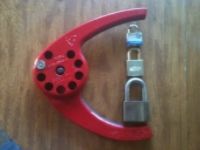Jacob Morgan wrote:Very good presentation, thanks for posting it. You pointed out cases where criminals not only picked locks but picked previously unpickable locks or even invented new tools. In my few minutes of research in a prior post, several cases of picking in crimes in the USA were identified, including a notorious group of bank robbers from about 20 years ago--one of them took the Foley-Belsaw course and even used try-out key sets to steal getaway cars after they picked open bank doors.
The presentation above pointed out parallels between ethical computer hackers and independent lock researchers. That is the way to look at it. In defending lock picking as a hobby, one does not need to claim that criminals don't pick locks. They were doing that shortly after locks were invented, in fact they were likely doing it more often before there was such a thing as locksport. Independently researching lock vulnerabilities, and informing manufacturers of issues, and educating the public of risks, increases security.
I like the old adage in the ethical lock picking community that, "Criminals don't pick locks". It is more helpful than it is a hard and fast rule. All methods of entry are used in commercial settings to gain access to large sums of money, or information that is worth large sums of money. And in residential cases, the same could be said for the wealthy households.
Most people don't have to worry about this because they are unlikely to catch the eye of criminals with enough skill to target their property in such a way.
But whenever I write about security, I like to mention that you should be aware of your specific risks. I have heard quite a few cases (some brought up on this site) of women whose ex-boyfriend/husband was a locksmith. If you know people who pick locks, who also have a reason they might be targeting you, then you should worry about your susceptibility to lock picking.
To put most people at ease "Criminals don't pick locks" speaks to a more streamlined truth. A more accurate statement would be something like, "The average criminal who would target your home is not going to pick your lock. However, if there are extenuating circumstances that place you at personal risk of being targeted by criminals with reason or means to use covert entry practices, lock picking might be a concern."
The second statement might be truer, but it seems to draw too much attention to an unlikely outcome. And drawing that attention negatively affects the hobbyist and locksport communities, who pick locks for fun and for the benefit of the security of these products.
Maybe this analogy is helpful: "A police officer has a gun and authority. If the police officer is a bad person, they can use force and their position to justify crimes they commit. They have the means to commit violence and the means to get away with it. But having police is beneficial, and being a police officer does not make you a bad person solely because you have the means to do bad things. Also, the police that do act ethically create the circumstances to weed out those who are unethical. Without police, you would still have people who used authority and force to act unjustly, but you would lose the effective way of bringing bad people to justice."
Ethical lock pickers help to stop the unethical lock pickers. You will always have the unethical lock pickers. You make their lives easier if you prevent the ethical majority from doing their work.




